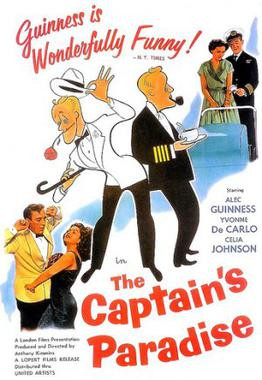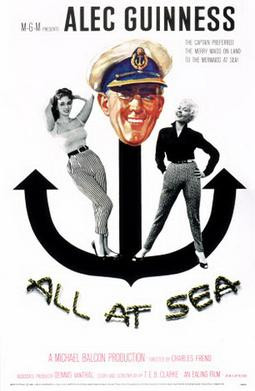| Reviews & Columns |
|
Reviews DVD TV on DVD Blu-ray 4K UHD International DVDs In Theaters Reviews by Studio Video Games Features Collector Series DVDs Easter Egg Database Interviews DVD Talk Radio Feature Articles Columns Anime Talk DVD Savant Horror DVDs The M.O.D. Squad Art House HD Talk Silent DVD
|
DVD Talk Forum |
|
|
| Resources |
|
DVD Price Search Customer Service #'s RCE Info Links |
|
Columns
|
|
|
Captain's Paradise | Barnacle Bill, The
Witty and adult, The Captain's Paradise starts out as one kind of movie then becomes something altogether different yet even more delightful. Almost by rote, it's told in flashback (a persistent peculiarity of Guinness's ‘50s comedies), after the seeming execution in North Africa of Henry St. James (Guinness), ferry captain of the The Golden Fleece, a passenger ship from Gibraltar to Kalique (the Spanish autonomous city bordering Morocco), in North Africa. Mourning his loss, Chief Officer Carlos Ricco (Charles Goldner) tells Henry's elderly uncle (Miles Malleson) the story of his captain, and man who after years of searching, finally found paradise.
In Morocco, Henry enjoys the company of vivacious (and much younger) lover Nita (Yvonne De Carlo). They wine and dine and, in one of the film's best sequences, they lustily dance while nightclubbing. Upon returning to Gibraltar, Henry enjoys a more sedate, typically English life with his domesticated, devoted wife, Maud (Celia Johnson), who cooks his favorite comfort foot, rissole, and marks their anniversaries with homemade cake before they retire, always promptly at 10:00pm. James presents Nita with lingerie and Maud with a vacuum cleaner and each is delighted.
James believes he's found the perfect balance in his life, and indeed it is -- for him. Eventually, however, Nita grows tired of the long nights of drinking and dancing and to James's horror wants to start cooking for him meals at home. Meanwhile, Maud is increasingly frustrated with her boring life, and on the spur of the moment flies to Kalique where she finds the hustle and bustle terribly exciting. She starts drinking and staying out late, perhaps with a new lover. Gradually it becomes clear that she craves a little fun and frivolity in her middle-age before it's too late.
And so, what starts out as a funny but undeniably sexist comedy about a clever man burning the candle at both ends unravels hilariously into a movie about two women finding empowerment in opposite directions. In this sense The Captain's Paradise anticipates Billy Wilder's later Kiss Me, Stupid (1964), in which a demur housewife and wily prostitute briefly change places and, lo and behold, find the experience liberating.
Though inconceivable imaging anyone other than Guinness as Henry, the movie was conceived primarily as a vehicle for Hollywood star De Carlo, who was originally to play opposite the likes of Ray Milland or Michael Wilding. De Carlo, to her credit, suggested Guinness and to everyone's surprise and delight he agreed to the part, which probably led to Celia Johnson's casting also. All three are great: Guinness is subtly smug and panicky by turn, while De Carlo is earthily sexy. Yet it was Celia Johnson who was nominated for the picture's sole BAFTA nomination, as Best Actress. She deserved it, for her transformation is the most dramatic and, from the moviegoer's perspective, the most satisfying.
Alec Guinness called Barnacle Bill (1957), first released in the U.S. as All at Sea, "wretched," a movie he made only as a favor to its director, Charles Frend (Scott of the Antarctic, The Cruel Sea). It's also possible he agreed to it as part of some obligation to MGM, for whom he had starred in The Swan the year before. Maybe he owed them a second picture. (MGM did finance the last half-dozen batch of Ealing films.)
Regardless, Barnacle Bill isn't nearly as bad as Guinness remembered. It's not great, but it does play like a summation of Ealing Comedy, whose last production this was. The premise is not far removed from Passport to Pimlico (likewise written by T.E.B. Clarke), Guinness plays multiple character like he had in Kind Hearts and Coronets, it's told in a flashback style reminiscent of The Lavender Hill Mob, and its charming musical score and sound effects recall The Man in the White Suit. The film is overly broad and a bit bigger in scale than the usual Ealing film, and its characters are, in some cases, sloppily conceived. But it's harmless, clever here and there and overall enjoyable if not entirely satisfying.
Guinness plays William Horatio Ambrose, from a family of mariners stretching back to caveman days (Guinness plays six ancestors through the ages). Unfortunately, he suffers from crippling seasickness (reflected in the seasick-inducing opening titles), and spends his career in the British Navy testing potential cures. In the unnecessary flashback structure, he details to a reporter a recent triumph.
After retiring from the Navy, Ambrose he uses his life savings to buy a dilapidated Victorian-era amusement pier in a coastal resort town. He repairs the pier but runs afoul of the city council, led by corrupt Mayor Crowley (Maurice Denham) and conservative bathing huts owner Arabella Barrington (Irene Browne). When Ambrose converts the pier's shabby music hall into a dance hall, for instance, the council has it closed (no public dancing allowed). Ambrose, joined by a frustrated Arabella, whose land is confiscated under compulsory purchase by Crowley, come up with a brilliant scheme: they convert the pier into a landlocked cruise ship under a foreign registry, thus making the pier unbound by local draconian regulations. Landlubbers prone to seasickness embrace the idea, and all seems to be a huge success, but the council will stop at nothing, even if it means sabotaging the pier itself.
One imagines Guinness was mostly unhappy about playing a character vaguely defined by the script, which is mostly limited to his seasickness and use of naval terminology for practically everything. He probably also didn't care for the climax, which relies heavily on miniature special effects and slapstick about on the level with Disney's comedies of the ‘60s rather than Ealing of the ‘50s.
The basic premise, however, is both sound and appealing, reminiscent of Passport to Pimlico but also the Ealing-esque The Smallest Show on Earth, which pays tribute to the simple pleasures of cinema-going and silent movies especially. In Barnacle Bill, an amusement park pier of the type depicted in the early scenes was quickly fading from British coastal resorts, as for that matter were old-fashioned ocean voyages Ambrose recreates for his customers.
The marvelous cast helps, with Percy Herbert, Harold Goodwin, and Sam Kydd in larger-than-usual roles while Allan Cuthbertson, Lionel Jeffries, Warren Mitchell and others have smaller-than-usual parts. Particularly funny are Miles Malleson (again) as an overcome angler, Donald Pleasance as a bemused bank teller, and Richard Wattis as a confused ship registrar. One of the unruly teenagers appearing in the first third of the movie is later novelist Jackie Collins.
Video & Audio
Licensed from Studio Canal, The Captain's Paradise is presented in its original 1.37:1 standard aspect ratio, while Barnacle Bill is 1.66:1 widescreen. Both films look great, with sharp resolution and strong blacks. Both movies are contained on a single disc, though given their running times this isn't too much an issue bit-rate wise. The audio, DTS-HD Master Audio mono, is similarly good, and supported by optional English subtitles, good for catching all the slang and police jargon. Region "A" encoded.
Extra Features
No extras, save for a trailer for The Captain's Paradise.
Parting Thoughts
Mostly delightful and reasonably priced, this double-bill is Highly Recommended.
Stuart Galbraith IV is the Kyoto-based film historian currently restoring a 200-year-old Japanese farmhouse.
|
| Popular Reviews |
| Sponsored Links |
|
|
| Sponsored Links |
|
|
| Release List | Reviews | Shop | Newsletter | Forum | DVD Giveaways | Blu-Ray | Advertise |
|
Copyright 2024 DVDTalk.com All Rights Reserved. Legal Info, Privacy Policy, Terms of Use,
Manage Preferences,
Your Privacy Choices | |||||||















